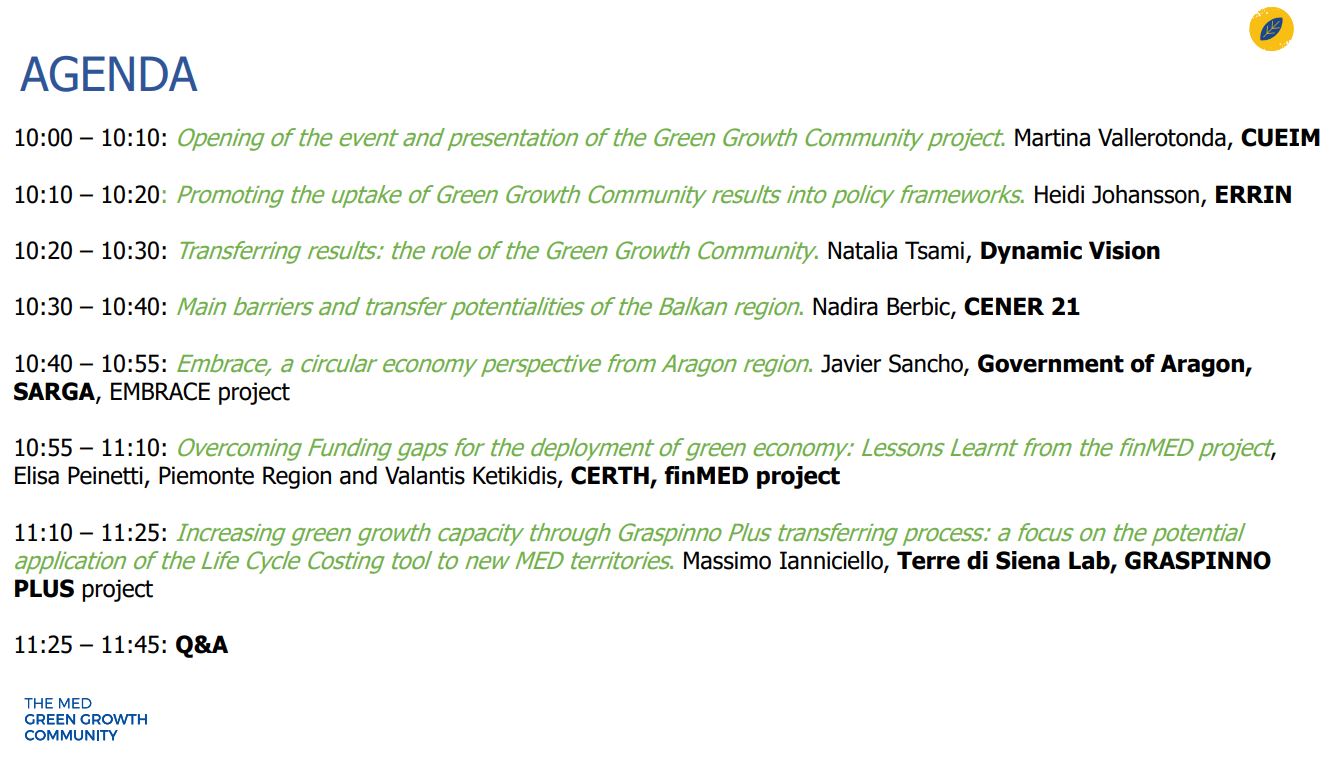On 14th October, the Green Growth Community took part to the Circular Week 2021 by INNOWO, organising the online webinar “Boosting Circular Economy: best practices from the Mediterranean region”. The Circular Week is an international campaign that consists of a series of events and initiatives devoted to the subject of circular economy and sustainable development taking place throughout Europe.
The webinar, organised by CUEIM, saw the participation of both Green Growth Community partners and Modular Projects representatives. It the first part, Martina Vallerotonda, Project Manager of CUEIM, introduced the Green Growth Community project and its main objectives and results for the promotion of a sustainable development through circular economy best practices and innovation. How the Community aims to enable a policy change in the thematic of green growth and circular economy was the focus of the presentation of Heidi Johansson, Project Manager at ERRIN. She described the mainstreaming, liaising and advocacy activities having the objective to promote the uptake of the Community outputs into policy frameworks at different governance levels. Natalia Tsami, Project Manager at Dynamic Vision, focused on the key steps for a successful transferring strategy, outlining how the Community guides and supports the projects to transfer the results achieved and the lessons learnt to different stakeholders from public sector, private sector, research and civil society. Concluding the session of the Community partners, Nadira Berbic, Project Manager at CENER 21 brought the experience of the current state, key barriers and potentialities and needs for circular economy development in the Balkans also providing an overlook of the contribution of the GG Community activities such as the coming stakeholder engagement workshops in Sarajevo and Banja Luka.
In the second part of the webinar, the Modular Projects GRASPINNO Plus, EMBRACE and finMED presented their best practices in the field of green finance and circular economy.
Javier Sancho, Lead Project Manager at SARGA, introduced the concept of circular economy and presented the necessary steps towards the implementation of an innovative and circular business model that can be enabled through the application of the EMBRACE toolkit. He gave examples of success stories of circular economy of enterprises that implemented the model for the production of agri-food products such as beer and meat and oil.
Representing the finMED project, Elisa Peinetti, Piemonte Region and Valantis Ketikidis, CERTH, focused on the main activities of the project aimed to Public Authorities and clusters organisations such as the implementation of the Capacity Building tool. The tool provides practical guidance on the nature of capacities needed, how to support their development to concretely devise and adopt new solutions and practices for innovation financing for green sectors SME. The presentation was occasion for finMED partners to share some reflections from stakeholders, primary to all the need for tailored support services to green SMEs and to communicate and show how green transition adds value to the economic systems, to society and to people well-being.
In conclusion of the webinar, Massimo Ianniciello, from Terre di Siena Lab, presented the project GRASPINNO Plus’ capacity in increasing green growth specifically through the potential application of the Life Cycle Costing tool to new Mediterranean territories. Life Cycle Costing is part of the GRASPINNO Unified Platform Package composed also by the GRASPINNO Database (specific data of the products) and the eGPP support tool (support for preparing the tender), tools that were developed and tested at transnational level within the previous phase of GRASPINNO project. These instruments are expected to generate territorial dynamics influencing local and regional communities, in terms of decision-making procedures and policies. The new dynamics will also be favourably affecting eco-innovation of clusters/networks for their products/services provision, focusing on GPP methods and other possible intervention areas such as Energy-Efficiency & other investment sectors.
All the attendees can access the presentations of the speakers and the recording of the webinar here.


 IT
IT 


